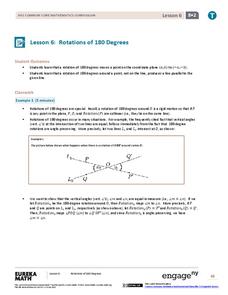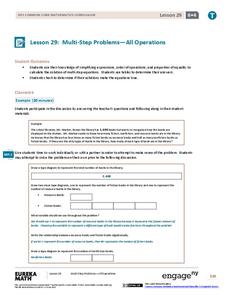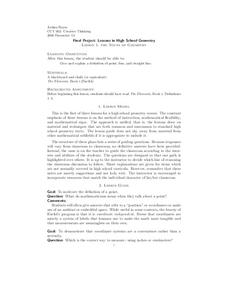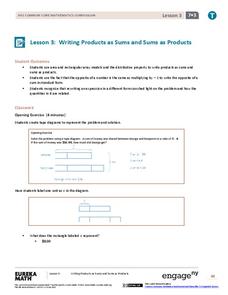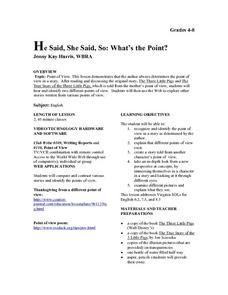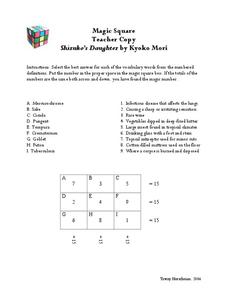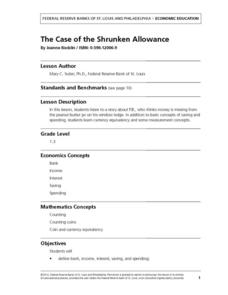EngageNY
Read Expressions in Which Letters Stand for Numbers III
Those key operation words sure come in handy. Groups continue their work with converting between different notations for algebraic expressions. They work in stations to write the symbolic form for given verbal phrases. This is the 17th...
EngageNY
Graphs of Functions and Equations
Explore the graphs of functions and equations with a resource that teaches scholars how to graph functions as a set of input-output points. They learn how the graph of a function is the graph of its associated equation.
EngageNY
Determining the Equation of a Line Fit to Data
What makes a good best-fit line? In the 10th part of a 16-part module, scholars learn how to analyze trend lines to choose the best fit, and to write equations for best-fit lines to make predictions.
EngageNY
Rotations of 180 Degrees
What happens when rotating an image 180 degrees? The sixth lesson in the series of 18 takes a look at this question. Learners discover the pattern associated with 180-degree rotations. They then use transparency paper to perform the...
EngageNY
The Euclidean Algorithm as an Application of the Long Division Algorithm
Individuals learn to apply the Euclidean algorithm to find the greatest common factor of two numbers. Additionally, the lesson connects greatest common factor to the largest square that can be drawn in a rectangle.
EngageNY
Ordering Integers and Other Rational Numbers
Scholars learn to order rational numbers in the seventh lesson in a series of 21. Reasoning about numbers on a number line allows for this ordering.
EngageNY
The Relationship Between Absolute Value and Order
Order up a resource on absolute value and order. The 12th installment of a 21-part module investigates the relationship between absolute value and the order of numbers on a number line. Scholars determine how the actual values and the...
EngageNY
Symmetry in the Coordinate Plane
The 17th installment of a 21-part module investigates symmetry in the coordinate plane. After plotting several examples, scholars develop a rule for the coordinates of a point after reflecting over the x-axis, the y-axis, or both.
EngageNY
Positive and Negative Numbers on the Number Line—Opposite Direction and Value
Make your own number line ... using a compass. The first installment of a 21-part series has scholars investigate positive and negative integers on a number line by using a compass to construct points that are the same distance from zero...
EngageNY
Multi-Step Problems—All Operations
Harness the power of algebra to solve problems. Young mathematicians learn to work out multi-step problems by applying algebraic techniques, such as solving equations and proportions. They use tape diagrams to model the problem to finish...
Curated OER
Multiplying by 10, by 100, and by 1,000
Fourth graders write tenths and hundredths in decimal and fraction notations. In this math lesson, learners know the fraction and decimal equivalents for halves and fourths. Everyone answers numerous questions posed by the teacher...
Curated OER
Families and Communities
Here is a week-long lesson on the roles of family members designed for first graders. In it, learners share stories of their families, listen to books about families read to them by their teacher, complete homework assignments and...
Harvard University
The Nouns of Geometry
Socratic questioning to teach Euclidean geometry? "The Nouns of Geometry," followed by "The Verbs of Geometry," and the misfit, "A Beginner's Story - The Equilateral Triangle" are designed to encourage learners to explore various...
EngageNY
Volume of Right Prisms
Apply volume and area formulas to find the volume of any right prism. The 26th lesson of a 29-part module examines methods for finding the volume of right prisms with varying shapes of bases. Learners use the formula V = Bh to find...
EngageNY
Slicing a Right Rectangular Pyramid with a Plane
How many ways can you slice a pyramid? The 18th lesson of the 29-part series examines the multiple planes of a rectangular pyramid. Pupils study each slice to determine its shape and relation to the different faces.
EngageNY
Checking for Identical Triangles
Examine an assortment of triangle congruence criteria in a single lesson plan. Building on the four previous lessons of the series, the 13th installment provides a mixture of the different triangle congruence criteria for pupils to...
EngageNY
Inequalities
The 13th activity in the 28-part module asks scholars to write linear inequalities from a problem situation. Individuals then solve and interpret their results in the context of the problem.
EngageNY
Writing Products as Sums and Sums as Products
Create rectangle and area models to help students understand expressions. The third installment in the 28-part series has pupils first represent expressions using rectangular array models. The exercises help scholars understand the...
Virginia Department of Education
Exponents
Expand your knowledge of exponents with an activity that promotes critical thinking and comparison skills. Middle and high schoolers compare numbers written in expanded and exponential form and explain their strategies for solving...
Virginia Department of Education
Road Trip
Help plan a road trip with linear equations. Scholars consider two different rental car companies and write equations representing the cost for each company. They graph the system of equations to determine the conditions under which each...
Virginia Department of Education
Inequalities
Compare graphing an inequality in one variable on a number line to graphing an inequality in two variables on a coordinate plane. Young mathematicians work on a puzzle matching inequalities and their solutions. They then complete a...
Curated OER
He Said, She Said, So: What's the Point?
Not by the hair on my chinny chin chin! Upper graders and middle schoolers read the story The Three Little Pigs and other tales related to the story from various points of view. They use the Internet to find more stories...
Curated OER
Shizuko’s Daughter: Magic Square
Vocabulary really adds up with magic squares! Using words from Shizuko's Daughter by Kyoko Mori, kids line up words and definitions to come up with the same sum across and down the square.
Federal Reserve Bank
The Case of the Shrunken Allowance
An allowance is an important thing! Make sure your kids know how to save and spend their own money. Using the book The Case of the Shrunken Allowance as a starting point, this plan covers income, spending and saving, counting, and more.



